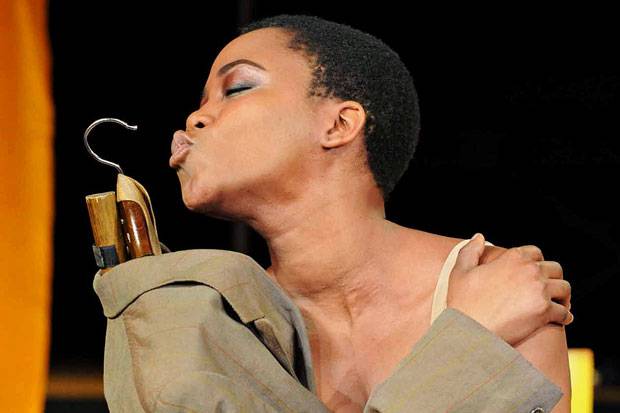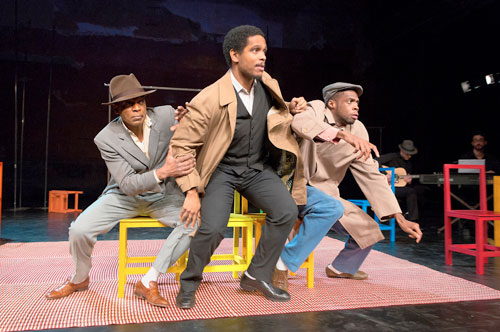The Johannesburg township of Sophiatown was the center of black cultural and political life in South Africa in the 1940s and 1950s. Resistance to white rule was becoming overt, while something of the same energy animated the music and literature coming out of the township. But in 1955 the apartheid regime removed the people of Sophiatown by force to empty areas west of the city in order to raze the shanties and build housing for the white working class. Among the black writers who had lived there was Can Themba, best known as a short-story writer and part of the group around Drum magazine, the most popular black journal of the time in the country. But as repression in South Africa intensified, Themba, born in 1924, was declared a “statutory communist,” and his work was banned. He went into exile in Swaziland, sank into alcoholism, and died in 1968.
Teeming township life had been one of his subjects. In his way, he did for South Africa what Cyprian Ekwensi—a prolific short story writer and novelist whose work drew international acclaim in the 1950s and 1960s—did for Nigeria, charting social upheaval as blacks shed the rural past in favor of the urban future. Themba’s short story, “The Suit,” first published in Drum in 1963 and quickly anthologized in Heinemann’s African Writers Series, captures the hopeful daily rhythm of the township, though blacks lived in crowded conditions and under legal discrimination. It tells the story of respectable Philomen, who works as a secretary for a white law firm and does not frequent the shebeens, or unlicensed drinking dens, that give the district much of its atmosphere at night. He is proud that, unlike other men, he does not beat his wife. He is devoted to the beautiful Matilda until one morning a friend tells him that she has been receiving a visitor after Philomen has left for work. Philomen rushes home and sees Matilda in bed with a man, who has only enough time to escape through the window in his underwear, leaving his suit behind. Philomen, eyeing the abandoned suit, conceives her punishment:
“We have a visitor, Tilly.” His mouth curved ever so slightly. “I’d like him to be treated with the greatest consideration. He will eat every meal with us and share all we have. Since we have no spare room, he’d better sleep here. But the point is, Tilly, that you will meticulously look after him. If he vanishes or anything else happens to him…” A shaft of evil shot from his eyes… “Matilda, I’ll kill you.”
Matilda feels her disgrace and tries to comply with the bizarre, humiliating terms set by her husband. Though she longs for forgiveness, she is mindful of her own feelings and desires as a young woman. She wants to live and can project a future for herself in spite of the silence of her home. She is active in the black women’s groups formed to get around the restrictions of the 1953 Bantu Education Act, which enforced racially segregated schools and closed off previously available avenues to education. However, in the middle of a party that Matilda has carefully prepared for, Philomen brings out the suit, places it in a chair, and insists that she treat it as an honored guest. The company is amused at first by what they are told is a game, but then Philomen makes plain his wife’s transgression. When he finally comes back from his city wandering, it is too late. Matilda has somehow died of her shame and grief, alone.
This sparsely told tale of betrayal was adapted for the stage in South Africa in the early 1990s. Peter Brook presented his production of The Suit at the Theatres des Bouffes du Nord last year. His English version is now at the Brooklyn Academy of Music, in the Harvey Theater, a space made to look distressed, in imitation of the look of decay that Brook’s Paris theater has made famous. Audiences will know immediately that The Suit is the work of Peter Brook, in its looking beyond Europe and the West for stories to tell on stage, and also in the elegant economy of the staging itself. The softly lit scene of bright yellow, blue, green, orange, and red wooden chairs, a small table, arranged on a large piece of yellow fabric, and bordered by three empty clothes racks waits for the action to begin.
It is a musical evening from the very beginning. Raphael Chambouvet ambles in, playing Schubert’s serenade on the accordion, and settles down at the keyboard stage right, soon joined by Arthur Astier on guitar and David Dupuis on trumpet. They are handsome Frenchmen in black, just as the African and African-American cast is beautiful and gifted, particularly the ravishing Nonhlanhla Kheswa, who plays Matilda. In the play, singing expresses Matilda’s dream of getting out, of freeing herself, and Kheswa is possessed of the kind of strong, lilting voice that quiets everything else in the room. In her rendering, for example, of “Malaika,” a haunting Swahili song about adultery, she is mesmerizing: large, expressive eyes, closely cropped hair accentuating the perfect shape of her head, her incredible posture—and then out comes the black velvet of her tone.
Advertisement
In a way, Brook wants to have it both ways in this piece, to pay attention to Sophiatown’s history and the brutal facts of apartheid, yet also to tell a story of adultery and jealousy that could happen anywhere. The two themes do not really fuse; they are not in operation at the same time. There is a sense of first one, then the other, now back. The adultery story in itself does not feel allegorical of social oppression, yet our expectations of work about apartheid communities like Sophiatown prepare us for broader comment on social reality. The actors’ accents remind us constantly where we are; the context is not obscure. But the few, brief conversations about discrimination that cause rueful laughter in Sophiatown are moments, a kind of adornment, and anything else would overwhelm the vulnerable Matilda’s fate.
Yet the play is faithful to the text. The characters switch from reported speech about themselves—the third person omniscient narrator of the short story to the first person and back—and some of the incidents about Sophiatown, such as what happened when a black friend of Philomen’s attempted to enter white churches, are taken from Themba’s reportage, collected in the posthumous The Will to Die (1972). And so as the evening progresses—the play is only one hour and fifteen minutes long—the music becomes a unifying element, an aspect of characterization, a further means of story-telling.
Brook worked with his long-time collaborator, Marie-Helene Estienne, and also with the composer Franck Krawczyk, and said in onstage remarks after a performance of The Suit that their intention had been to draw on music from different periods and places. You hear music by Miriam Makeba, and Bach, and Billie Holiday. Jared McNeill, who plays Philomen’s trusted friend, Maphikela, gives a moving rendition of “Strange Fruit,” and it is so unexpected, to find it there, and sung by a male voice at that. Everything that happens in the evening is a surprise and the great surprise is the overall restraint—in the treatment of the material, in the performances themselves, in the language of a theater where the actors can each hold a single expression for a long time. Then, too, the rhythms of the piece are swift and sure, extending the sense of its musicality.
William Nadylam, who portrays Philomen—he was in Brook’s amazing, compressed The Magic Flute—is especially graceful. He can pose with ease on a clothes rack, making it the bus crammed with washerwomen that he takes home to discover the truth. “From those bundles crept miasmata of sweaty intimacies that sent nauseous waves up and down from his viscera.” The Suit is direct, but Brook’s production turns it into something more suggestive. The restraint makes the tale convincing. The passion warming the surface is expressed in song, and the effect is to make a sad story also an enchanting one.
Peter Brook’s production of The Suit is playing at the Brooklyn Academy of Music through February 2.




